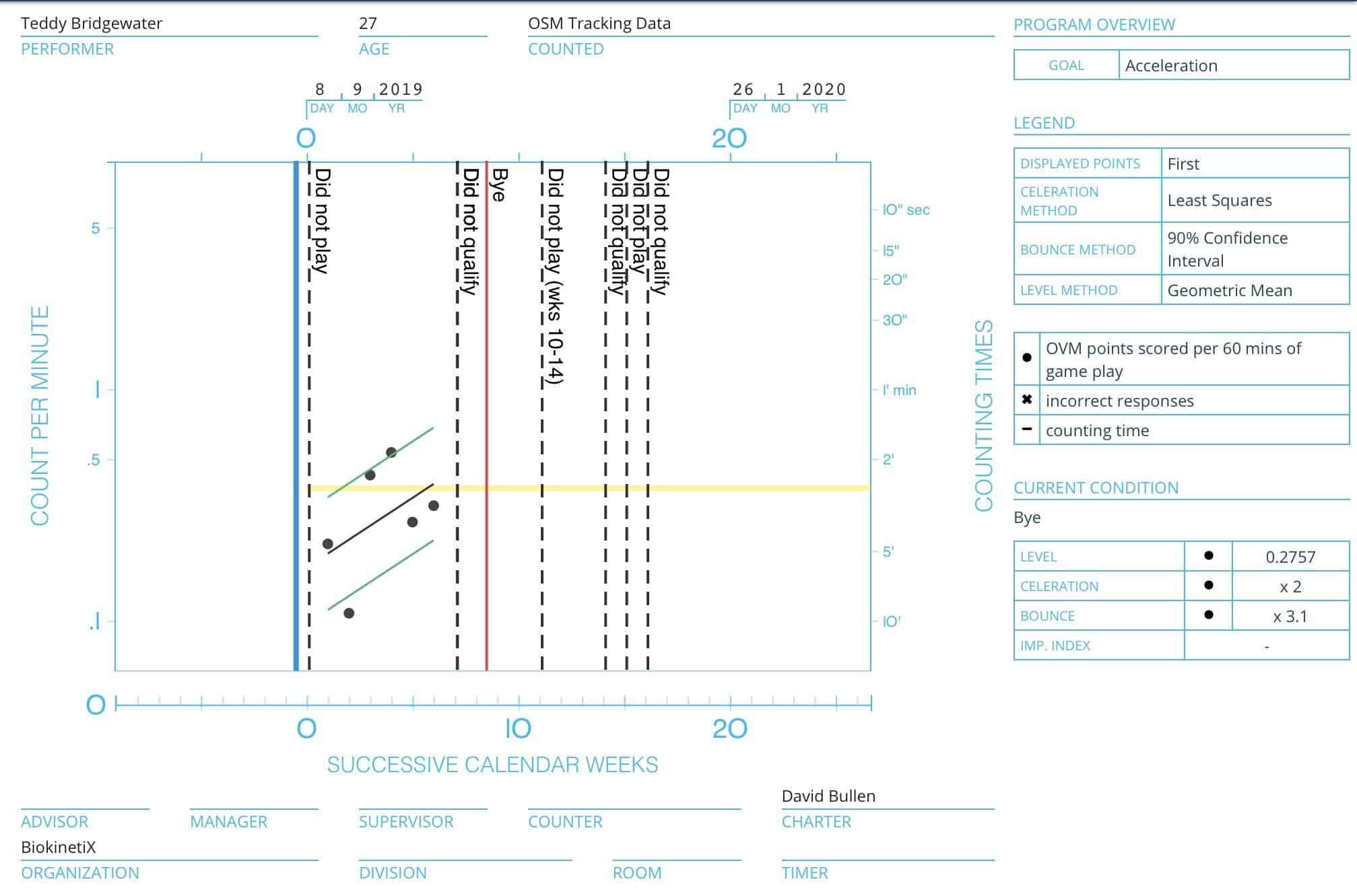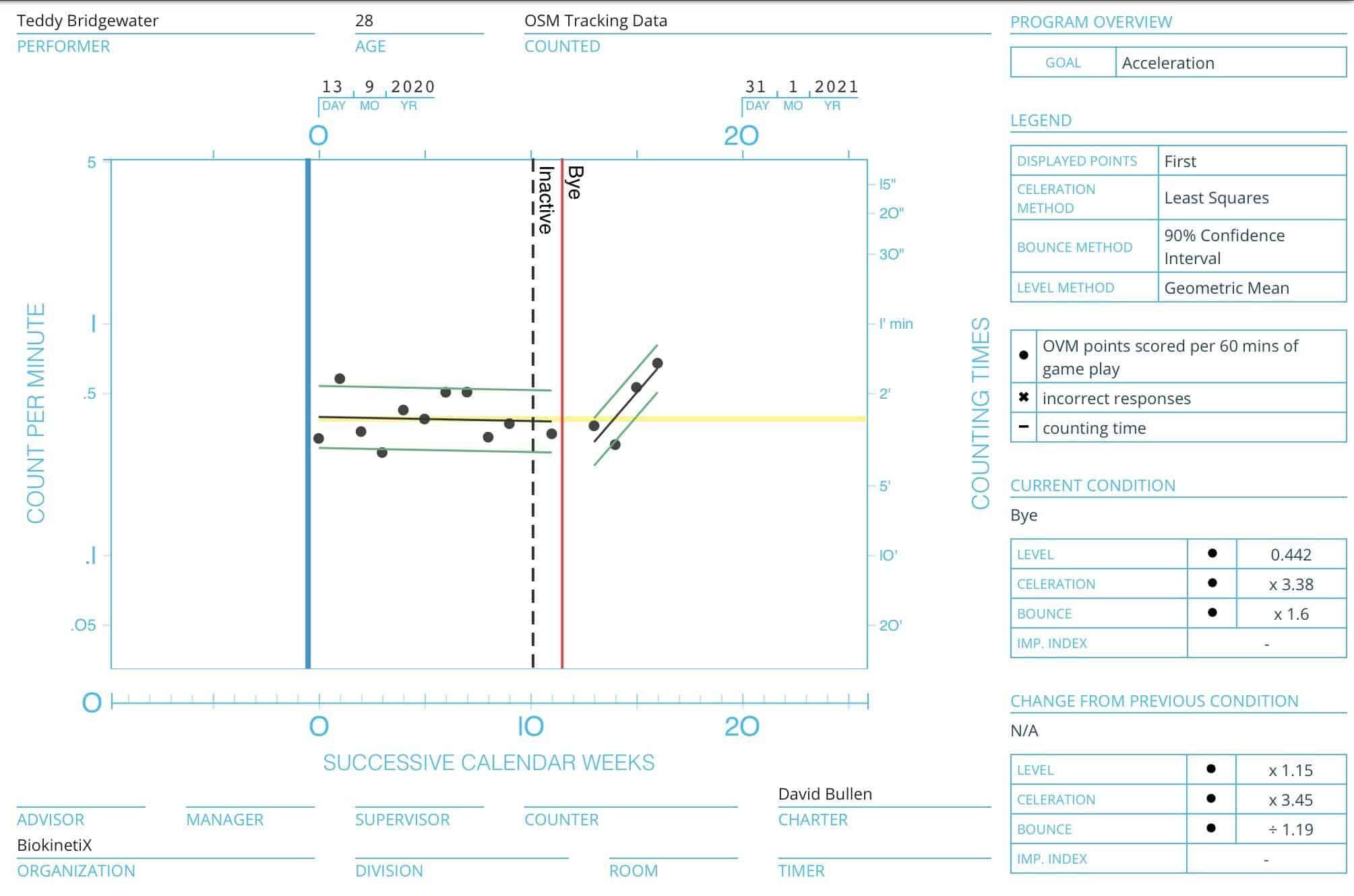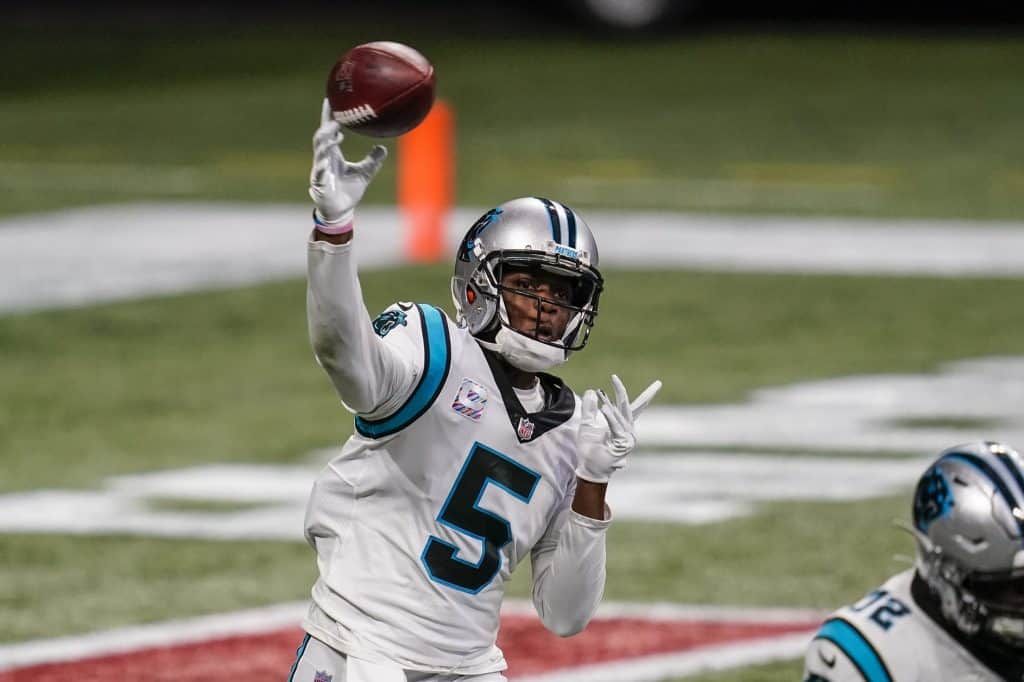The Carolina Panthers recently traded for Sam Darnold, who the New York Jets are presumably planning on replacing with an NFL rookie. That brings the fate of Carolina’s incumbent starting quarterback, Teddy Bridgewater, who the team has given permission to seek a trade, into question. It seems that several teams have interest in acquiring him. The question is then, is Bridgewater actually worth trading for?
Teddy Bridgewater’s statistics were mediocre at best last season
In a literal sense, Bridgewater’s 2020 statistics were the best of his NFL career. However, there are a few caveats that need to be mentioned. First, Bridgewater has only played in 13 or more games two other times during his six years in the NFL. And second, his statistics last season, while better than anything he’s previously produced, still weren’t particularly impressive.
In his first season with the Panthers, Bridgewater threw for 3,733 yards, 15 touchdowns, and 11 interceptions. There are worse box scores a quarterback could have. At the same time, it’s easy to see why the Panthers thought it would be worth looking for an upgrade.
Bridgewater’s advanced metrics also fall short of brilliance
Like his traditional statistics, Bridgewater’s advanced metrics aren’t terrible, but they are far from elite. Let’s start by looking at his Offensive Value Metric (OVM) grades. The OVM is a grading system created by the (Bx) Movement to measure players by how much influence they had over their offense’s performance.
Bridgewater’s grade of 24.0 ranked just slightly below the midpoint among all qualifying quarterbacks from last season. That means he provided only average value to the Panthers’ offense last season, which matches fairly closely to what his traditional statistics show us. In short, he didn’t lose his team many games, but he didn’t win them many either.
It is worth noting that Bridgewater’s 2020 grade does represent a significant improvement from the year prior when he played six games with the New Orleans Saints. During that six-week stretch, he earned a grade of 18.92, the sixth-worst grade at his position.
For a player to improve so dramatically in a single season is impressive. If Bridgewater continues to improve at that rate in future seasons, he could develop into an elite quarterback. That said, it is difficult to assume that such a scenario will occur six seasons into his career, even if injuries took much of that time from him.
Examining the advanced metrics behind Teddy Bridgewater’s OVM grades
The advanced metrics involved in creating Bridgewater’s OVM grades paint a vivid picture of his performance in Carolina. He consistently threw the ball a short distance downfield, 7.3 yards on average across all of his pass attempts and 5.1 yards on his completions. Those were the ninth and eleventh-lowest averages, respectively, among all quarterbacks last season.
Bridgewater also threw into tight windows just 12.2% of the time, the fourth-lowest percentage. Put those statistics together, and it becomes clear that Bridgewater attempted far easier passes than many of his competitors. Under normal circumstances, that would result in an OVM grade that was well below average.
However, Bridgewater’s grade was improved dramatically by excellent completion statistics. He had the fifth-highest completion percentage (69.1%) in the NFL in 2020. Additionally, that percentage was 2.3% higher than expected according to the NFL’s advanced metrics, the 13th-best differential.
In other words, while his passes weren’t especially difficult, Bridgewater completed them at an extremely high rate. That might not sound particularly impressive on the surface. However, there are plenty of quarterbacks who attempt similarly easy passes but fail to be nearly as efficient. And while it would be best to have a quarterback that is both influential and efficient, if you can only have one of the two, efficiency is often preferable.
Examining Bridgewater’s weekly grades
Bridgewater’s status as a consistently average quarterback is further cemented by his week-to-week OVM grades. In the charts below, you can see his grades from each week of the last two seasons, marked by the black dots. For comparison, the yellow lines show the league average OVM grade for quarterbacks during those seasons.


During his brief time as the starter in New Orleans, Bridgewater was inconsistent. He started poorly but improved dramatically during his final four games.
Last season was a different story. Bridgewater was incredibly stable in Carolina, hovering around the league average for almost the entire year and even spiking slightly at the end of the season. Once again, the statistics show Bridgewater to be a consistent, albeit unspectacular, player.
That isn’t necessarily the most flattering description, but to a certain extent, it is actually a point in Bridgewater’s favor. Having a reliable presence at quarterback, even if their overall level isn’t exceptionally high, can be highly beneficial to an offense.
Bridgewater would be a perfect backup, but his potential as a starter is limited
Bridgewater presents an interesting problem for any team looking to sign him. If signed as a backup, he would immediately become one of the best insurance policies in the entire NFL. It has been proven time and time again that having a backup quarterback you can rely on if the starter gets hurt is invaluable.
Nick Foles showed that during the Philadelphia Eagles’ Super Bowl run, and Chad Henne did so again last season when he helped send the Kansas City Chiefs to the AFC Championship game in relief of an injured Patrick Mahomes.
However, it’s difficult to make the case for Bridgewater as a starting quarterback at this point in his career, which is likely what he wants. Perhaps a playoff-ready team that only needs a solid quarterback to push them over the edge could take a chance on him.
Unfortunately, most of those teams are either looking to draft a rookie quarterback, such as the San Francisco 49ers, or have already signed a veteran, such as the Chicago Bears or the Washington Football Team. At this point, Bridgewater’s options are rapidly shrinking.
Bridgewater might win quarterback competition in Carolina
Of course, if no team is willing to trade for Bridgewater, the Panthers might benefit from keeping him around. In fact, assuming Bridgewater is hoping to find a starting role, staying in Carolina might be his best bet.
The Panthers presumably signed Sam Darnold to be Bridgewater’s replacement. However, while Darnold has more upside than Bridgewater, as I discussed in a recent article, he has struggled during his short NFL career. That was especially true last season when he was one of the league’s worst quarterbacks.
In a direct competition between the two, Bridgewater has a legitimate chance of winning the starting job. He may not get the same opportunity elsewhere.
Wherever Bridgewater ends up playing in 2021, it will be interesting to see how he performs. As it stands, the statistics all suggest that he is an average quarterback. Perhaps a new situation (or a second year in Carolina’s offense) will help him prove the statistics wrong. Then maybe he can finally turn his career around and live up to the potential the Minnesota Vikings saw when they drafted him back in 2014.
Want more NFL news and analysis?
Be sure to follow us on Twitter (@PFN365) to stay in the loop on all things around the NFL. Also, continue to visit Pro Football Network for NFL news and in-depth analysis concerning the 2021 season and beyond.
Lucas Ellinas is a writer for Pro Football Network. You can follow him on Twitter @Lucas_Ellinas.

